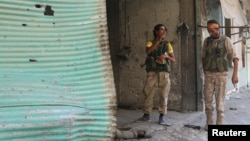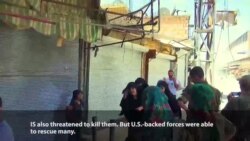With the Islamic State (IS) routed from one of its key strongholds in northern Syria, U.S.-backed forces are setting their sights on ridding IS from border crossing towns that have been key supply points for the militants.
“This will obviously make a significant shift on the battleground [in Syria],” said Jonathan Spyer, director of Rubin Center for Research and International Affairs.
"As [anti-IS] forces take control of more border regions in Syria, ISIS [IS] will be forced to withdraw further," he added.
Groups affiliated with the Syrian Democratic Forces (SDF), a U.S.-backed alliance of Kurdish and Arab fighters, reported Friday that they have taken control of Manbij – an Arab-majority town in Syria’s Aleppo province.
WATCH related video:
Human shields
The Manbij offensive began in June, when anti-IS forces advanced toward the city from several fronts with the help of U.S.-led coalition airstrikes. The coalition has conducted more than 500 airstrikes in Manbij, paving the way for local fighters to make.
“The city is now entirely under the control of our forces,” said Shervan Derwish, a spokesperson for the SDF.
He told VOA that his forces were able take over the remaining areas under the control of IS, despite attempts by the terror group to delay it.
“They [IS] had set the local market on fire and created a lot of smoke… to prevent the coalition warplanes from hitting them,” said Qandil Kobani, a fighter with the SDF.
Watch related video report:
As more territories were lost to the U.S.-led forces, IS grew so desperate that they were using civilians as human shields. Militants held thousands of civilians and threatened to kill them if SDF fighters and their international backers inched closer to their positions, local reports said.
“Daesh [IS] had implanted mines around the last two neighborhoods it held to prevent civilians from leaving,” local reporter Ekrem Salih told VOA by phone.
Some of those who chose to escape were killed by stepping on mines set up by IS.
“We received 25 wounded people only today,” said Yassir Bali, a physician who is based in the nearby town of Kobani.
He told VOA on Friday that his hospital received at least 10 injured civilians daily who fled Manbij.
Fleeing residents spoke of horror as they attempted to seek refuge.
“We were besieged for weeks,” said Fatima Beri, a resident of Manbij who is in a hospital in Kobani.
“As we were running Daesh [IS], my husband got shot in his stomach. The shot was so strong that it sliced up his stomach. He was laying down on the ground for a long time before the Kurds came to our rescue,” she said as she was sitting beside her wounded husband.
There are reports that as IS fled this week they took more than 2,000 civilians hostage to use as future human shields as U.S.-backed forces further advance toward other IS pockets in northern Syria.
Resupply routes
Held by IS since 2014, Manbij had served as a major supply route for the terror group, connecting Raqqa – its de facto capital – with Turkey. IS smuggled supplies to keep its effort going throughout northern Syria. Now IS will struggle to resupply, analysts said.
“Losing Manbij would weaken the IS war effort,” said Nicholas A. Heras, a Middle East researcher at the Center for a New American Security, a Washington-based think tank. “[It would make it] more difficult for IS to move reinforcements and supplies from Raqqa to the Aleppo area frontlines.”
The U.S.-led coalition believes that the liberation of Manbij will help in their impending battle against IS in Raqqa.
“Manbij will inform us as to how we are going to fight in Raqqa, as Ramadi has informed how we'll fight up in Mosul,” said U.S. Gen. Sean MacFarland Wednesday during a briefing from Baghdad.
U.S.-backed forces launched a major offensive in May that liberated large areas in northern Raqqa. Their objective is to liberate the top IS stronghold in Syria, military leaders said.
“The fall of Manbij would provide the SDF, and the U.S.-led Coalition, the opportunity to demonstrate that it can hold, provide security for, and govern newly-won territory from ISIS,” analyst Heras said, using another acronym for IS.







